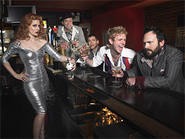These hometown fans are typical of an American Scissor Sisters crowd -- fringy, urban, hip twentysomethings who love dance music, a nearly absent genre on American radio. The Ballroom masses explode with glee during the band's hyperactive disco remake of Pink Floyd's "Comfortably Numb," the band's first major U.K. hit. They have six or so.
Four weeks later and 3,000 miles away, there are 11,000-plus Scissor Sisters fans gathered at London's Wembley Arena. It's the first show in a three-day Thanksgiving-weekend stand, and instead of New York hipsters with spiky hair and jaunty scarves, these fans range from fairly chaste preteen girls who idolize Ana Matronic (Ana Lynch, the Sisters' glittery pop princess) to middle-aged-mom types, cheering for a guy named Babydaddy (Scott Hoffman, multi-instrumentalist and co-songwriter), to thuggish guys, who are watching Jake Shears (Jason Sellards, Babydaddy's songwriting partner and the band's flamboyant frontman, who's currently cavorting around in shiny little-boy shorts). This assorted mix of devotees pushes toward the stage, screaming and wearing the requisite feather boas and bright pink bunny ears, while clutching inflated Scissor Sisters logos -- a pair of scissors suspiciously resembling splayed legs clad in high heels.
Every American article written about the Scissor Sisters -- rounded out by drummer Paddy Boom (Patrick Seacor) and guitarist Del Marquis (Derek Gruen) -- mentions three things: Three of the five Sisters (Shears, Babydaddy, and Marquis) are openly gay, the music sounds like a cross between Elton John and the Bee Gees, and the band is "famous in Europe," that universal backhanded compliment. But the Scissor Sisters are famous not only in Europe; their first single from Ta-Dah, "I Don't Feel Like Dancin'," hit the Top 10 in eight different countries, and they are touring the world. Essentially, they are famous everywhere but here, and the "Can they break America?" question won't go away.
They might be too dancey to get radio play, or maybe they're too campy. But these are just code words for "too gay." Homophobia is the last refuge of accepted blatant prejudice in a country that has laws banning gay marriages. It probably didn't help that the Scissor Sisters' initial volley, "Comfortably Numb," takes a deified classic-rock band and turns it into a flamboyant punch line.
"I think that's sort of a testament to the British public," Ana Matronic says. "They don't give a shit who you are, as long as you make good music." The Scissor Sisters are most famous in England, where "Comfortably Numb" first broke. Over there, everything that turns Americans off is an asset. Here, the band's 2004 debut sold a respectable 300,000 copies, on par with critical darlings like Bloc Party and the Arctic Monkeys; compare that to 2.7 million copies sold in the U.K., which made it that year's best-selling album. That trend has continued with Ta-Dah -- in the U.S., it charted at 19 and quickly disappeared. In the U.K., it entered at 1, while "I Don't Feel Like Dancin'," co-written with Elton John, topped the singles chart.
This disparity extends to the road. While their U.S. operation is more modest -- a much smaller staff and 3,000-seat spaces -- the U.K. arena tour lasted three weeks and covered 13 venues, including halls that seated in the tens of thousands. This double life would almost seem cruel, except the band doesn't seem to mind a bit. "Great. Great. Love it," says Matronic, who's putting on her makeup for the show while the hairstylist preps her Hollywood-quality wig. "It's like being a superhero. You put on your cape, fly over to London, and save the day. Then you put your glasses and your three-piece suit back on, and you're Clark Kent back in New York."
This way, they have it both ways -- they can be stars, then come home and go to parties at local clubs and not be bothered. "I couldn't have this existence follow me around in my home, so I actually really like the dichotomy," Marquis says.
"You know, I was just happy when we got a record deal," Paddy Boom adds. "I'm surprised that it's still getting bigger. I almost thought it could have been a swan song with Live 8 [during last summer's performance, they shared the stage with U2, Madonna, and Paul McCartney, performing to 200,000 people], 'cause this business chews up bands and spits them out."
He needn't have worried. The Wembley show is a full-fledged event, as opposed to the straightforward club sets they play in the States. As at many large-scale shows, two gigantic JumboTron screens flank the stage, which is transformed throughout the night to create different "scenes"; at one point a giant theatrical mask drops down from the ceiling, and the finale is an explosion of confetti, fittingly raining glitter on the audience.
Each night ends with a costume change and an encore. The Sisters retreat to an eerily quiet backstage area to catch their breath before heading back out into the roar of the crowd. "The moment when we come back for the encore, and we do 'I Don't Feel Like Dancin',' and that was No. 1 here for like four weeks -- to see this sea of people, everybody's hands in the air, everybody freaking out, pumping their arms, really going for it -- is such a mindfuck," Matronic says. "It's like, 'Wow! Whoa! I guess they like us.' It's a Sally Field moment. 'You like me -- you really like me!'"












